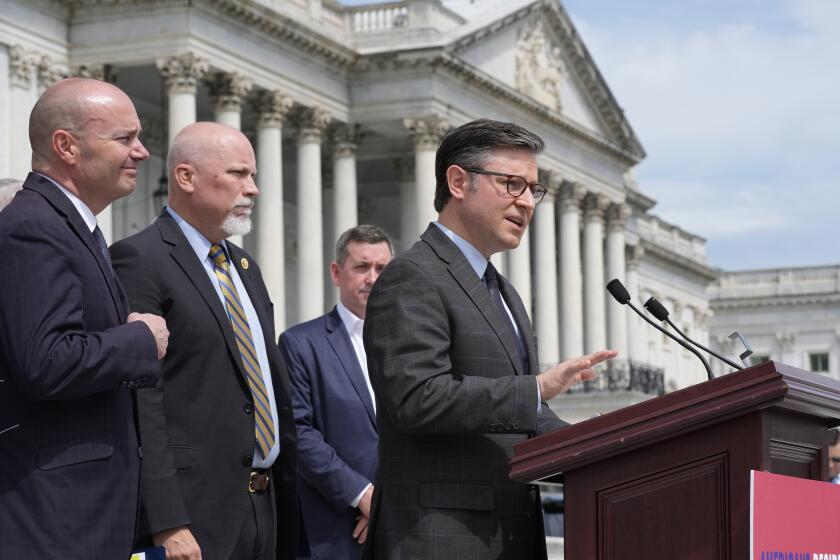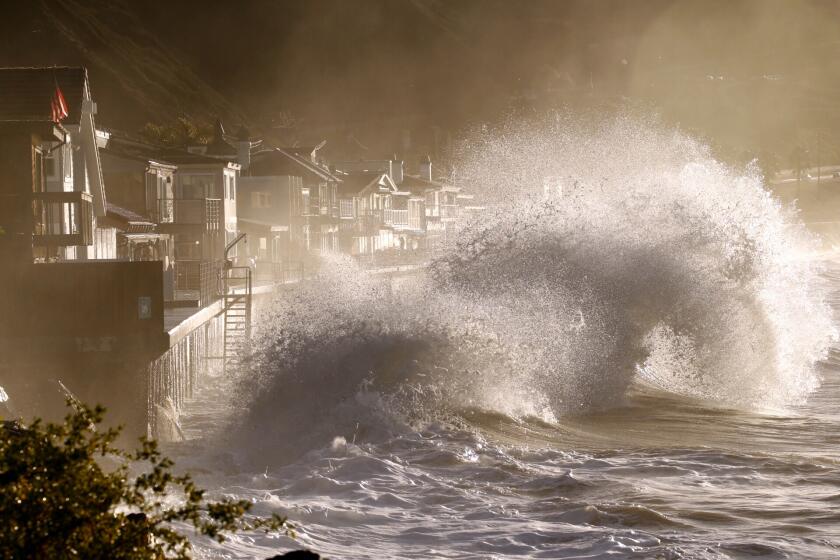PERSPECTIVE ON DRUG TRAFFICKING : A New Narco-Reality Dawns in Latin America : The violence and criminality of ‘Colombianization’ is a bigger force than democracy across the hemisphere. The U.S. wages the wrong war.
“We are becoming Colombia!”
The warning, delivered with the appropriate cry of alarm by Argentine Economy Minister Domingo Cavallo, rang throughout every government office in Buenos Aires. Some of Cavallo’s fellow officials took the somber diagnosis as an insult to their country and government. Others saw it as an accusation that could have serious diplomatic implications. But the real target of the slur--Colombia--didn’t bother to answer it.
In every Latin American country, from Mexico on south, “becoming Colombia” is a buzz-phrase among commentators and officials, the threatening prophecy or terrifying diagnosis of what the nation has become or soon will be: a stinking bog of corruption, violence and immorality--the demons that assemble around the expanding, unstoppable and most profitable business in the world: drug trafficking.
A decade ago, Colombians pretended that their degradation was a secret, even if an open one. And so it is now among their neighbors. Governments try to tapar el sol con un dedo--cover the sun with one finger, as the Spanish saying goes--while their citizens are all too aware of the presence and infiltration of drug trafficking all around them. After all, the drug deals involving politicians, business luminaries, athletes and film stars are in the media every week and in every country. Each time, they are less cause for scandal or even fuss.
The “narcogates” abound. In Argentina, members of President Carlos Menem’s family were accused of drug money laundering in 1993. Two years later, Economy Minister Cavallo appeared on TV and before Congress to accuse drug-related “mafias” of influence deep inside the government. Paraguay’s army has long been corrupted by drug trafficking. Bolivia’s government has incessantly been rocked by drug-related corruption, despite government adherence to a hopeless U.S.-mandated program for eradicating coca crops. Peruvian army generals have become increasingly involved in trafficking as a result of Lima’s decision to militarize the drug war. Uruguay has perfected the art of money laundering, while drug experts worry that Brazil, embarked on a vast program of neoliberal economic reform, is the next great drug-trafficking frontier. Caribbean island nations have virtually been bought by traffickers who use them as transshipment stations. And Mexico, the most Colombian of all, according to the U.S. government, has the greatest potential to replace the Cali cartels with its own equally influential, powerful and deadly organizations.
Why should trafficking among the rich, powerful and famous shock people when among their acquaintances, and sometimes even among friends and family, there are some touched in one way or another by a trade that by definition is grass-roots?
Try to find a taxi driver in Rio de Janeiro, Cali, La Paz or Buenos Aires who cannot show a visitor the luxury apartment buildings, upscale shopping centers and five-star hotels erected to launder billions of dollars of dirty drug profits. Such is the progress that comes with “narco-money,” as linguists call it, along with many other signs of the times: narco-malls, narco-mansions, narco-ranches, narco-riches, narco-justice, narco-campaigns and the latest phenomenon in the drug-tainted era of Latin electoral freedom, narco-democracy.
With their enormous experience, Colombians are the most pragmatic. Whether or not President Ernesto Samper resigns, polls show that even if Colombians believe him guilty of drug-related corruption, he could survive politically. Although that could be read as cynicism or apathy, it is in fact something far deeper: the product of years of a bizarre social evolution. When the drug boom began in the 1970s and early 1980s, Colombians were tolerant. Then they tried to fight it, and as a result became the victims of waves of narco-terror waged by the traffickers. Finally, they accepted the truth of its powerful presence, its role in daily life. Now, they have to adjust accordingly.
Their neighbors are still learning. They all know that the lists inside and outside their countries of those tainted by narco-dollars are too long to document and growing by the day.
The United States has crafted the rhetoric of combat in an international campaign against drugs. American officials, in their stubborn policy of treating the problem at its core as a complex police challenge, see themselves leading a holy war of good versus narco-evil, of ethics versus narco-corruption, of democracy versus drugs. With that approach, they have allowed the industry to outgrow any imaginable proportions and left its critical economic imperative unchallenged.
The United States continues to fight on the wrong battlefield. The diagnosis sounds simplistic because it is simple: Narcotics trafficking began because of its enormous revenues, and those revenues will keep propelling its growth.
Colombia’s narco-political crisis is a reminder of that hard, dirty, unethical and illegal economic reality that expands clandestinely and practically unimpeded throughout the Americas--from the Bolivian campesino families who lovingly nurture their small coca plots in Chapare to the young gang members who make their future selling smack and crack in South-Central L.A. The fall of Samper--like the billion-dollar war on drugs and the lengthy crop-eradication programs in the producing nations--will change nothing. Business is business. The laws of supply and demand are virtually biblical in their application, however much governments may wish otherwise.
Here’s a statistic to keep in mind. In the early 1980s, U.S. cocaine consumption was estimated at 30 tons a year. A decade later, the figure had more than doubled to 70 tons. At the time of his testimony before the U.S. Senate last year, the head of the Drug Enforcement Administration, Thomas A. Constantine, said that more than 100 tons of Colombian cocaine were warehoused in Mexico, waiting to cross the border. In Mexico alone, Constantine said, trafficking was a $30-billion-a-year industry.
“Colombianization” means more than extended violence, or governments challenged by vast criminal organizations. At its heart it means an unprecedented economic phenomenon.
For the first time in their histories, Latin countries are united not by foreign exploitation or runaway international debt or rampant poverty, but by a wildly productive multinational business. Cartels, subcartels, subsidiaries, subcontractors and autonomous organizations whose internal workings are a mystery to even the most expert experts--it all combines to create a virtual monopoly, with earnings that put it ahead of most of the world’s richest legal companies, its owners among the most fabulously wealthy in the world. Yet that business depends entirely on local resources and local manufacturing--total Latin control of a process aimed at American, European and Japanese demand.
Think of it: The traditional poles of economic power are changing despite an appearance of business as usual. A new, violent and threatening power functions throughout the region behind the traditional capitalist, democratic structures, spreading like a cancer thanks to its very illegality.
New words, new meaning to old words, new social classes, new economic rules. It all adds up to this: The time has come to recognize a new reality in Latin America, even if the consumer countries, led by the U.S., prefer to believe that the old order remains unchanged. The banana republics are not trafficking in fruit any more.
More to Read
Start your day right
Sign up for Essential California for news, features and recommendations from the L.A. Times and beyond in your inbox six days a week.
You may occasionally receive promotional content from the Los Angeles Times.






